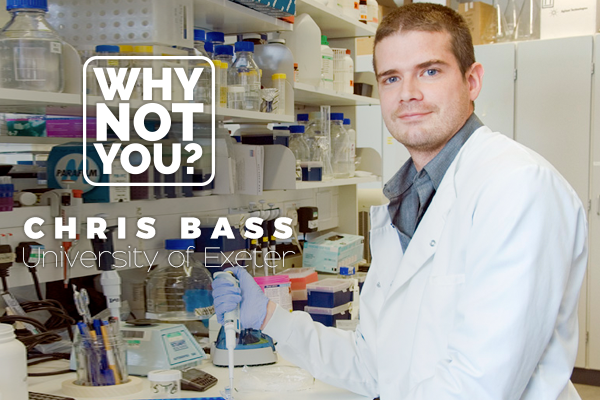The big picture: using wildflower strips for pest control
Inside Knowledge: Showing you can talk to-, work with-, or get money from industry is a winner when it comes to your academic CV.
Dr Chris Bass, an expert on insect pest control spent almost 10 years of his career at Rothamsted (including as a prestigious BBSRC Institute Career Path Fellow) and left in 2015 to take a position at the University of Exeter, where today he is Chair of Applied Entomology.

“My collaborations with industry ranged from knowledge exchange which led to co-authored publications, contracts involving delivery of a service for a fee, and joint collaborative projects funded by the industry partner. These were overwhelmingly positive interactions and contributed in different ways to my development.”Dr Chris Bass
Chris’ career path shows how industry collaborations can help boost a career in academia.
His work on the identification of the molecular mechanisms underpinning resistance to neonicotinoids in aphids allowed Chris and his colleagues to collaborate with the Insecticide Resistance Action Committee, who coordinate industry response to prevent or delay the development of resistance in arthropod pests.
“That collaboration enabled me to gain invaluable insights into the challenges faced by crop protection companies, whilst the in-depth expertise available in our group was invaluable to the creation of an industry-wide strategy to prevent or delay the development of resistance in arthropod pests. The work also led to the development of country-specific resistance management strategies. As a scientist, I was delighted to see such clear impact from my research,” said Chris.
Industrial partners often provide access to complimentary facilities not available in academic organisations. Chris said: “Access to state-of-the-art facilities and bigger-scale testing capabilities enabled us to make knowledge gains that would not have been otherwise possible. It was excellent to be able to call on their capabilities to accelerate our research”.
Given the increasing competitiveness of winning funding from UK Research Councils or EU programmes, universities are interested in diversifying their portfolio of funding, with industrial funding being a high strategic priority. Basically, universities love it when academics can access funding to deliver collaborative projects with industry.
Chris said: “I believe my track record of attracting industry funding was a contributing factor in my selection for the position at Exeter.”
Want to learn more about the topic? Get in touch with our Insider!